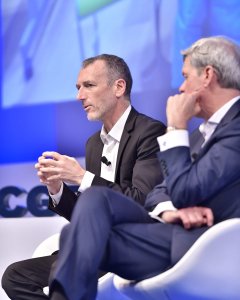Sharon asked Boer about the distinction between being leaders and being victims in the health and wellness space. Boer said food had never been safer, and food products were the most beautiful products in the world. Food was not inherently dangerous; it was simply that customers sometimes needed help to make the best choices.

Faber said there was a food revolution under way. Assumptions which had held for 50 years or more were now being challenged by consumers, who were actively looking for alternative ways to buy food. Just by looking at the range of additional brands available through the internet it was clear there had never been so wide a range of local product available, and brands with a clear sense of purpose. If large retailers and manufacturers were unable to match that purpose, they would continue to lose share, point by point. Boer said that it was important to integrate incentives into retail organisations to reward engaging with local communities and advocating healthy eating. He added that as an industry with millions of employees, they should start by attending to their health.
Faber agreed, noting that employee consultation was at the heart of 
Boer described the ‘Collaboration for Healthier Lives’ in‐store initiative in Colombia where local university sports scientists had joined retail staff to pilot exercise classes to encourage customers to try out routines for free, and another one in the United States with nutritional advice available from experts in‐store as part of a broader community initiative to tackle rising levels of obesity. Faber talked about another CHL initiative in Turkey where customers were able to compare an ideal personalised shopping list with their most recent purchases as recorded by loyalty card data before they went around the store. They had quickly been able to see a shift towards more healthy purchases. In a scheme in Japan aimed at the needs of older customers, proximity retailers had started to offer health and nutritional advice to a generation less familiar with digital delivery. Other projects, such as health screening outreach in Costa Rica, were due to rollout across the world. Faber stressed how important a multi‐local approach was, because real progress would be made one shop at a time.
Boer said that the consumer goods industry could catalyse a movement, but it had to engage a range of stakeholders across government, education, families and health providers. Consumer companies should also be looking at existing initiatives which could be scaled up and amplified by the voice of the industry and its capacity for impact measurement.
